Yes, dear reader, K, P & I are about to eat yet again. However, our next stop A Padaria do Povo (The People’s Bakery) is, I think, at least as interesting for its history as for its food. (It’s also possible that because we’d already eaten so much it clouded my judgement but you’re stuck with my judgement so you’re going to get a taste of its history.)
It’s my guess that if you’re not looking for this place you’d be as likely to walk past it without realizing there’s a restaurant within as you would to identifying it as a place to eat because
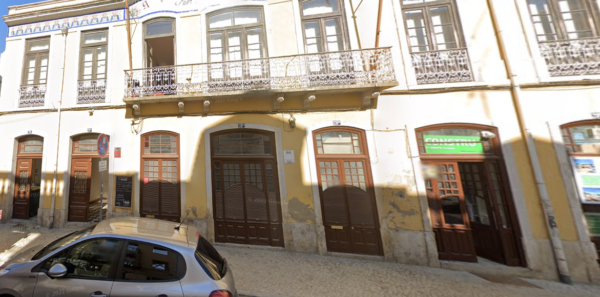
other than the small chalkboard announcing daily specials by the second door from the left, it simply doesn’t look like a restaurant – probably because it’s a Cooperative that’s part artistic and cultural center for the neighborhood – perhaps even more than it is a restaurant. Add to this the need to go upstairs and through a common room before reaching the restaurant and it becomes even a bit more mysterious.
A Padaria do Povo – a história
Founded on 17 October 1904 by D. Carlos I at his wife Dona Amélia’s request, A Padaria started its life as a bakery (hence it’s name) to provide bread for poor people in the area – particularly in the parishes of Santa Isabel and Campolide. However, although the king established it with the support of the neighborhood’s bourgeoisie, it quickly became as much a community center as a bakery. And, even from those early days, a counter-cultural anti-monarchical ideology pervaded the newly established Cooperative.
Dom Carlos was assassinated on the Praça do Comércio (aka Terreiro do Paço) on 1 February 1904 giving rise to the unstable First Republic and the Cooperative became more firmly established in this period. The Universidade Popular Portugesa (Portuguese Popular Univeristy) was established in January 1919 with a statutory objective of contributing to the general education of the Portuguese people. The University, which would eventually become rather prestigious, began by leasing rooms in the Cooperative.
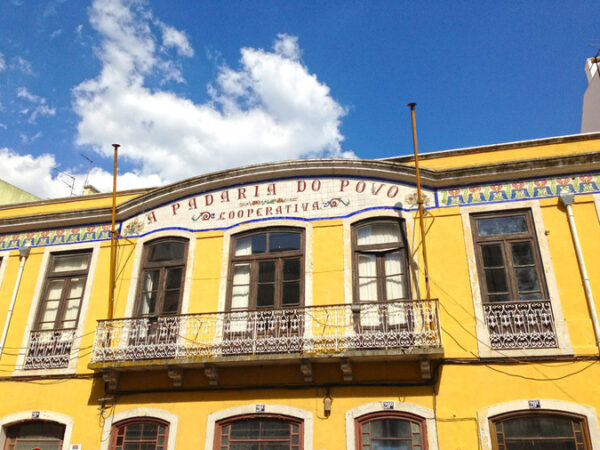
Eventually, a coup d’état toppled the shaky First Republic on 28 May 1926. It was first replaced by the National Dictatorship (Ditadura Nacional) and eventually by the Estado Novo (New State) headed by António de Oliveira Salazar – the dictator who ruled as Portugal’s prime minister with an iron hand for 36 years from 1932-1968.
Take away the secret meetings, take away the chance to fight
Under the Estado Novo, the Cooperative was forced to cease its bread production which led to it becoming one of the places in Campo de Ourique where people who opposed the rule and especially the tactics of the dictator Salazar held clandestine meetings. One legend has it that during police raids people would hide in the in the old bakery’s enormous but then unused ovens. The bakery reopened for a brief time in 1959 so we can be reasonably certain no one was hiding in its ovens then.
Ines didn’t tell us if the Cooperative was hosting any anti-establishment meetings in the present day but we did learn that there are regular dance classes and stand-up comedy nights every other Thursday as the current owners, André Costa and Vasco Loução are trying to bring it fully back to life.
They opened the restaurant, where we indulged in chamuças filled with shredded soy (since we were all eschewing pork) and curried prawns with saffron rice,
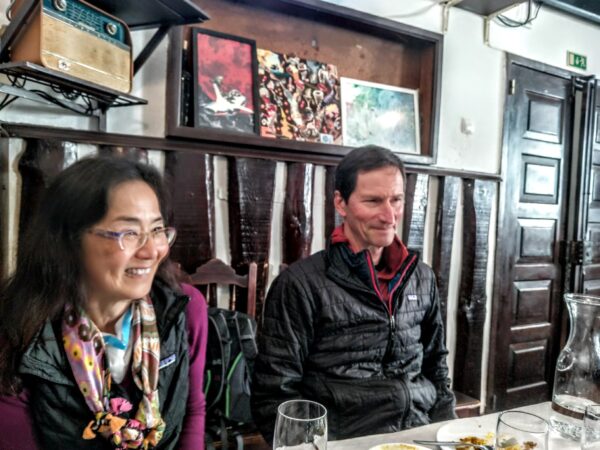
in 2013. It has something of a homestyle menu offering snacks and petiscos (small plates) as well as main courses.
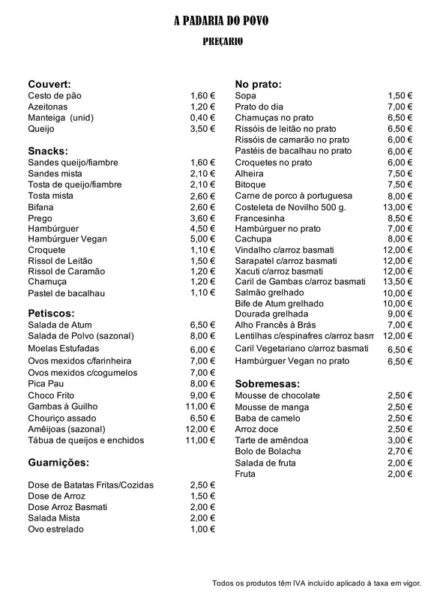
(From A Padaria do Povo)
Tying some of the histories together, in addition to chamuças you can spot among the main courses (No prato) Vindalho and Sarapatel both served with basmati rice.
No cup of Tito but let me offer you some more history
Lojas com Historia
As it was with stopping at the Livraria Alfarrabista Campo de Orique, I can’t say if our next stop is one that Ines usually includes on her tours, if it arose because there were only three of us and we were getting a little value added, or whether she simply sensed some food fatigue on our part. We were certainly nearing the end of our tour and, as it turned out, not a lot of comestible consumption remained. Regardless which of these factors was at play our next stop was at Livraria Ler and was, like that earlier one, not in any way alimentary.
It should be clear by now that I’m someone who believes that one way to get to know a city is to walk through different neighborhoods and as I do, I like to think that I’m observant of my surroundings. If you were to walk through Lisboa using this approach and looked closely at the small shops, you would occasionally see a shop displaying a sign like this one
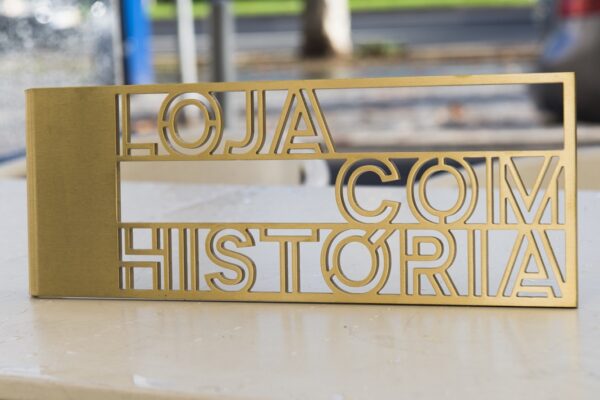
that one could reasonably translate as “historic shop.” The sign is displayed like a banner and is intended to facilitate pedestrian recognition of local enterprises that have met certain established criteria.
Created in 2015 by the Lisbon City Council, the intent of the Loja com História project was to boost local commerce, promote national products and culture while simultaneously safeguarding traditional commerce in its heritage, historical, and cultural aspects. Not every store can receive the distinction. There’s an application and review process for shops seeking the designation.
Once the application is submitted, a multi-disciplinary working group makes cumulative assessment of factors such as commercial activity, the existence and preservation of architectural heritage or cultural, and historical materials. If approved by the working group their recommendation is forwarded to and must be validated by an advisory board. The final step requires confirmation by the mayor or the deputy mayor concerned. The program started with 82 shops and has since expanded to 155 as of this writing. In addition to specialty shops it includes restaurants, fado houses, jewelers, and even barbershops. All of the shops are listed here and I’ve done business at 11 of them.
By now, I’m sure you’ve discerned that Livraria Ler is a Loja com Historia. According to the limited biographical material I could find, the shop’s founder, Luis Alves Dias, had always dreamed of opening a bookstore in Campo de Ourique – a neighborhood he likened to Paris’ Rive Gauche. He realized that dream in 1970 and his portrait hangs prominently in the store.
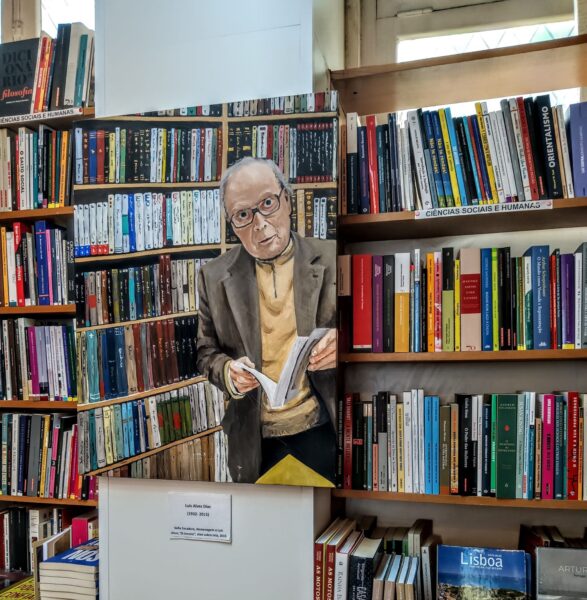
One might wonder how a store founded barely 50 years ago might earn a place as a Historic Shop in a city with a history as long as Lisboa. The answer is related to the books he sold. Or, more crucially to the books he sold surreptitiously. The Estado Novo still had a firm grip on power in 1970 and had an extensive list of banned books that it believed posed any potential threat to the regime. It maintained a powerful force of secret police who had a wide array of informants that it used to identify and then severely punish its perceived enemies and this would have included people who read books on the banned list. It’s these books that Alves Gomes sold from hidden spaces in his shop to trusted customers.
After the 1974 Carnation Revolution, Alves Gomes was able to operate freely and annually produced a display of the former regime’s seizure records. Luis Alves Gomes also had a long career as an editor most notably of the Maria da Fonte collection that focuses on politics, social causes, and revolutionary theories. In addition to operating as a bookstore, it also currently serves as another of the neighborhood’s cultural centers. It features poetry readings and musical sessions, a reading club, and weekly story reading sessions for children. One historic shop, indeed.
We’ll reach the end of our tour with some additional exposition about Portuguese cuisine and a brief post about our final two stops.
Good read there Todd. I was entertained.
Clandestine meetings, hiding in unused ovens.
Sounds like an episode on the Food Channel to me.
I stopped by just because I wanted to know more, than just looking at a photo.
I’m glad you did. If I had known before hand about hiding in the ovens I’d have at least asked to have a look at them. Sadly…